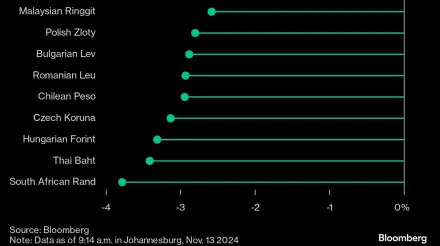(Bloomberg) -- Emerging-market assets fell Wednesday as the dollar extended gains on a bet that Donald Trump’s new US administration will have strong support to push through his policies.
MSCI’s emerging-market stock index slid as much as 0.8%, sliding for a fourth straight day for its longest losing streak in three weeks. The index has erased $650 billion in market cap over that period. Meanwhile, a gauge of emerging-market currencies hovered at its lowest in three months, undermined by dollar’s surge to a two-year high against a basket of currencies.
The performance gap between US equities and elsewhere has widened as Trump’s cabinet shapes up, with key posts going to loyalists poised to execute “America First” policies. This is stoking concerns that a push for higher tariffs, especially on China, will gain traction, accelerating inflation and limiting central banks’ ability to cut interest rates. Investors have also been disappointed by China’s piecemeal efforts to boost its economy.
“Dollar strength has traditionally been bearish for EM equities,” said Mislav Matejka, head of global equity strategy at JPMorgan Chase & Co. “Without a more meaningful fiscal stimulus from China, EM could remain a laggard, especially as trade and tariff uncertainty weigh on the region.”
Trump’s cabinet picks are also reported to include noted China hawks, raising the prospect of worsening ties between the world’s top two economies. The yuan has slid to a three-month low versus the dollar, stoking unease at China’s central bank which set its reference rate for the yuan at 7.1991 per dollar, well above the average estimate in a Bloomberg survey.
China is also marketing dollar bonds in Saudi Arabia, in what will be the country’s first debt sale in the US currency since 2021. It’s offering three-year and five-year securities with initial price guidance of about 25 basis points and 30 basis points over the respective US Treasury yields, according to people familiar with the matter.
South Africa too forayed into dollar bond markets on Tuesday, raising $3.5 billion in the first global debt sale after the country’s May elections.
Later on Wednesday, Zambia’s central bank will decide on interest rates later today, having kept policy steady since hiking rates to 13.5% in May.


